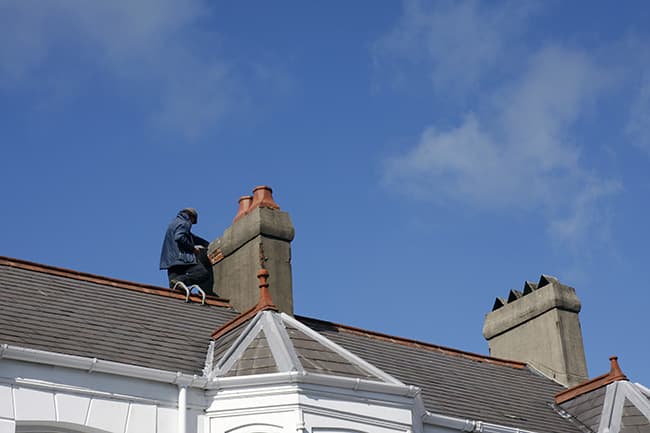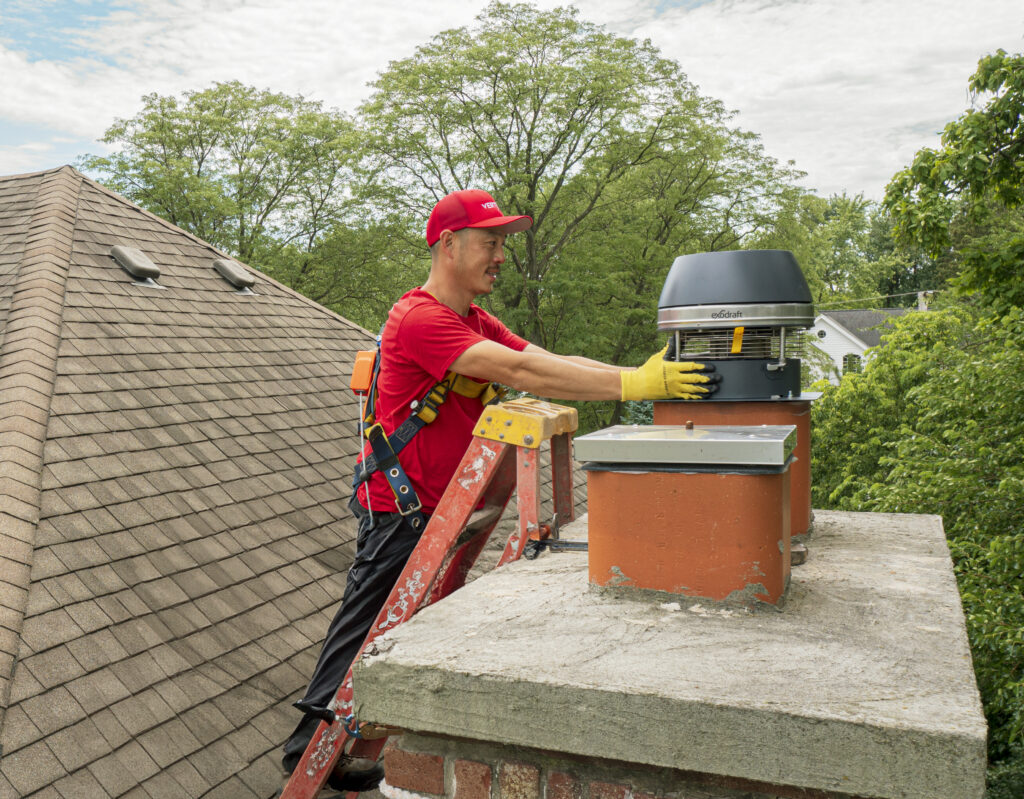
Chimneys are often a forgotten part of a house. People spend lots of time thinking about the front door, the garage, the lawn and they don't spend much time considering that the fireplace and the chimney are very important elements of a home.
However, the fireplace is one of the most sought-out features of homes according to many home buying sources. If the fireplace is a very important feature for homebuyers, the chimney then needs to also be paid attention to since it's in an integral part of the fireplace.
Chimneys may look like they are simple structures since they're just long and rectangular-shaped but they're actually very complex. They also are quite important to the functioning of the fireplace and the safety of the home (read about fireplace safety here).
Possible Problems with Brick Chimneys
There are several possible problems that can occur with a chimney, especially one that has been left vulnerable to weather problems. Read on to find out all about waterproofing your brick chimney.
There are three main problems that can affect the chimney. The first has to do with the weather damaging the lining systems. There may also be flue obstructions. There may also be masonry materials that have come loose.
All parts of the home will eventually deteriorate in some way over time simply from wear and tear. It goes without saying that the longer you use something, the more likely that it'll no longer be in top shape.
Some of this is expected and normal. However, bad weather can make this deterioration occur much faster. If you live in an area that has a ton of moisture such as the Midwest, where heavy snows and storms can bring lots of condensation to your chimney. Due to the cold weather, it's also where you may see more homes with fireplaces.
Masonry Equipment Issues
When there's cold weather and it snows, hails, or sleets outside, then certain parts of the chimney may freeze. That means that certain pieces that go into the construction of the chimney may freeze once they have hit a certain temperature.
Once that temperature increases, there's a point when those materials will then undergo the thawing process. The freeze and thaw process is especially hard on masonry materials according to the Chimney Safety Institute of America.
Some of the parts of the chimney like iron or steel will rust when they come into contact with water.

Consequences of Having a Damaged Chimney
There are many potential problems that can occur from water damaged chimney. These problems can occur inside and outside of your home. In terms of the fireplace, you can have the flue lining system crack.
The hearth support can collapse. The chimney can become lopsided or even worse, the chimney can become stained. As a result, the mortar can start to fall apart. Your home can suffer problems such as having staining on the walls and ceiling from water penetration.
Your central heating system can even be impacted negatively. The fireplace glass doors can start to rust. These are just some of the issues that can arise. Plus if you have creosote, you might notice a terrible smell that surrounds the fireplace in your home from water mixing with it.
How Do I Weatherproof My Chimney?
One solution is to get a chimney cap. However, if that's not sufficient, you may want to choose a type of weatherproofing that's well rated and able to keep moisture away. One major place where water tends to leak into the chimney is through the mortar joints. Water can find its way into a number of places, but these joints are the most common.
If you're going to do weatherproofing (as opposed to hiring a trained professional), you’ll need to make sure of a few things. First, check that your roof isn’t too steep. You don’t want to fall off.

Next, make sure to wear shoes that won’t let you slip off the roof. Having someone to spot you can be a great help.
After you make sure that it's safe for you to do the job yourself, you’ll want to clean the chimney as best as you can of loose dirt, leaves, and other natural remnants. You can get a cleaner at any nearby lawn and garden store. You can even use a power washer to do this if it's easier. You may need to use plastic cloths to protect any parts of the chimney that see fragile.
If you notice a ton of cracks that don't look beyond repair, you will need to use a substance that resembles paintable caulk to fill them in. Any other more serious damage may require you to get an experienced professional.
Next, to keep water out, you’ll want to apply a special water repellent spray. You can’t use sealer on chimneys because the sealer will trap any moisture that comes in through the joints. You don’t want to trap moisture where it will grow and impact the masonry.
Instead of using a sealer, use a special water repellent spray by starting at the bottom of the chimney and spraying upwards to the top. It’s helpful to be able to do a second coat of the spray a few minutes after you do one.
Remember that if it seems too difficult, hiring an expert who specializes in chimneys and fireplaces may be a great idea. Go for someone with a lot of experience and who has worked with other chimneys in your neighborhood.
Your fireplace needs to be protected from the outside elements. That means that all parts of the fireplace including the chimney should have special protection from storms, rain, snow and any other sources of moisture. Weatherproofing your brick chimney doesn't need to be that difficult. Following the guidelines addressed here, you can easily save yourself some trouble and protect one of your homes most sought-after features.
Waterproofing a Brick Chimney is Our Specialty
Water penetration is the number one cause of deterioration and damage in chimneys. For that reason, waterproofing a brick chimney is important in order to prevent any problems in the future. Early Time has been keeping Chicagoland homes clean and safe for over 30 years. Contact us today to speak with a specialist!
